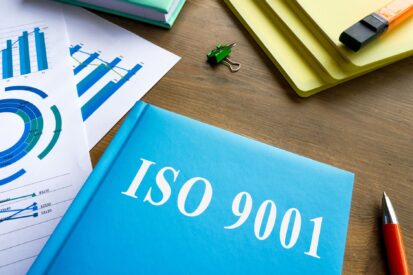If you are acquiring your ISO 9001 certification, you may have read that the standard will help your organisation build an effective “QMS.” However, what is the actual definition of a QMS? In this article, we will answer all your pertinent questions related to a QMS and ISO 9001.
What is QMS?
A Quality Management System (QMS) is a set of internal rules defined by a collection of records, documented procedures, processes and policies. This set of rules creates a system that helps a company achieve the creation and delivery of products or services consistently. When implemented correctly within an organisation, the QMS would require your products or services to be specific to maintain consistency regarding quality.

Therefore, it is essential to tailor your QMS per your unique needs and never duplicate the policies/procedures of another organisation. Many quality management experts advise how a QMS should be implemented, increasing the chance of missing critical elements.
However, to create an effective, sustainable, reliable and efficient QMS, you must ensure that you do not miss the critical elements of a sound system. Here, ISO 9001:2015 becomes a saviour as it is intended to help standardise how QMS is designed.
What is QMS according to ISO 9001?
ISO 9001 is an internationally acclaimed set of requirements for creating procedures, processes, policies and rules to provide services and products that consistently meet customer needs and aim to improve customer satisfaction.
This standard is maintained by International Organization for Standardization (ISO). It was created after taking consensus by a majority of member countries, making it the gold standard for the processes utilised worldwide.
The recommendations outlined in ISO 9001 are written so that they can be applied to organisations, irrespective of the scope or complexity. The flexible nature is what makes the standard extremely loved by business owners.

Additionally, as industry leaders and quality management experts have collaborated to create the recommendations, the standard is filled with practical steps that do not require organisations to invest in new equipment or locations.
Instead, the standard teaches business owners to appropriately utilise their resources and address competency gaps in the personnel through specific training programmes. Additionally, the standard’sstandard’s practicality is increased as it incorporates seven quality management principles to make the QMS more feasible.
Seven quality management principles of ISO 9001 QMS
The ISO 9001 standard is based on seven quality management principles, each serving as a critical focus for the QMS. These principles include:
• Customer focus: You need to focus on your customers’ needs if you want to deliver products or services that are repeatedly sold. Customer focus is the foundation of customer satisfaction, and incorporating this quality principle into your organisation ensures that you are constantly meeting customer requirements.
• Engagement of people: The most critical asset of your organisation is its people. If you do not utilise your most important asset by incorporating the knowledge and experience into the QMS, its functionality will remain rudimentary. By appropriately engaging with your people and incorporating their feedback, you will be able to uncover hidden opportunities as well as risks that were not so apparent, thereby ensuring that you and your QMS are constantly improving.
• Process approach: The definition of a process approach is utilising inputs and creating outputs so that everything within the system is measurable. Sometimes, outputs need not be physical and can include information or energy. Everything becomes systemised and structured when you incorporate a process approach into your organisation. As a result, how different processes interact becomes more precise, and the progress of every process can be tracked.

• Evidence-based decision-making: You cannot manage your business if you do not know exactly how your processes operate. For this, you need insightful data. The ISO 9001 standard urges organisations to create key process indicators so that every process can be appropriately measured. This will help the management take decisions based on evidence instead of relying on their guts. As you can imagine, this is exceptionally beneficial for your growth as your decisions are supported by numbers and insights.
• Relationship management: At times, the only way to improve a product or service is to have the supplier improve the quality of their raw materials. To do so, you must learn how to manage your relationship better. ISO 9001 brings relationship management to the frontline of operations so that business owners can manage their relationships better with their suppliers, other partners and even their customers.
• Leadership: If the organisation’s leaders do not prioritise quality, the employees will do the same. ISO 9001 urges leaders to showcase their commitment by allocating appropriate resources to incorporate a quality-first culture within the organisation.
• Continual improvement: The ISO 9001 standard urges business owners to continually evaluate their processes. This process of periodic assessment helps to continually improve the functionality of the QMS.
Conclusion
The QMS is a set of policies that helps organisations manage the quality of their products or services. The gold standard to build an efficient QMS across the globe is ISO 9001, which incorporates seven quality management principles: continual improvement, leadership commitment, relationship management, evidence-based decision-making, process approach, engagement of people and customer focus. if you want to get iso 9001 certification, you can contact us








Users Comments
Get a
Quote